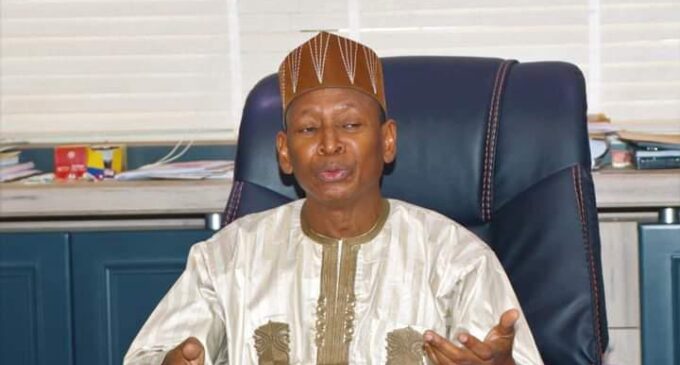How Nigeria makes ‘thieves’ of its citizens

If it weren’t sad, a story currently making the rounds on social media would be a considerable source of comedy. However, for what it tells about us as a people, the story, if it is true, should give Nigerian leaders some food for thought.
Following the arrest of the accountant-general of the federation, Ahmed Idris, (for alleged money laundering and diversion of about N80b), the federal ministry of finance, budget and national planning appointed Anamekwe Nwabuoku to oversee the office of the accountant-general.
Days after the government named him, unconfirmed reports indicated that allegations of corruption against Nwabuoku also existed at the Economic and Financial Crimes Commission (EFCC). The social media post also reminded Nigerians that Idris’ predecessor, Jonah Otunla, was also accused of diversion of funds and charged to court. Otunla, however, entered a plea bargain and returned the sum of N6.4bn to the federal government instead of prosecution. Even if the report about Nwabuoku is untrue, we have uncontroverted evidence that two of the three AGFs between 2011 and date have betrayed the country’s trust. That is enough reason to worry.
How is it that those in places of responsibility in Nigeria abuse their offices? The question is even more pertinent in Idris’ case. He was due for retirement when he turned 60 in November 2020, but President Muhammadu Buhari kept him, presumably after relentless pressure from various quarters.
What is it about a public office that people like Idris would rather stay back even after attaining the mandatory retirement age? Why would people like attorney-general of the federation, Abubakar Malami, (after spending N50m on obtaining the form to be governor of Kebbi state), labour minister, Chris Ngige, (after expressing an interest in becoming president in 2023) and women affairs minister, Pauline Tallen (who wanted to become a Senator) backtrack and choose to remain in the federal cabinet when Buhari asked them to resign?
Why would these three characters contemplate remaining in the cabinet and running for political office in the first place? Were they hoping to appropriate state resources in the actualisation of those dreams? And why, when they had to resign, did they choose the existing office over the elective offices that had elected to vie for? Is the “we die there” attitude to public office in Nigeria indicative of something worthy of attention? Why is the President, who is the appointor of these people and a self-avowed fighter of corruption and misuse of office, unwilling to confront this issue? These and many more questions should run through the minds of every concerned Nigerian.
But we should also ask ourselves why we do not interrogate these tendencies, and why we respond the way we do when news like this breaks.
For the government, the default reaction to people whose misconduct get exposed is first, a media trial, followed by prolonged investigations, after which the accused gets an administrative bail, and then, a trial that may last forever or end in some compromise like in Otunola’s case.
The increasing audacity of these pilferers dazes the citizen. In 2015, it was N6bn for Otunla. Seven years later, it is N80b for Idris. We marvel at how much the stakes have risen and then start jokes that would make us laugh and forget this story. Despite all the stories we hear, Nigeria has not reached a stage where it can think through a manifest problem and find lasting solutions to it. That, itself, is more worrisome than the Buhari administration’s inability to deal with corruption.
I am not surprised by any of these things, though. It always seemed obvious that the administration would be a woeful failure at its attempt to fight corruption because it does not understand the war that it set out to fight. And with the way the office of the accountant general has unravelled, we should see that this society has a big problem.
Yesterday, I heard the story of a Nigerian who emigrated in January this year. Earlier this week, he reportedly got an emergency call from the secondary school his teenage child attends. The child was in severe pain and needed surgery. The school needed his consent. He wondered how a child he saw a few hours earlier could be in such a state and rushed down to the hospital. He signed the form, and within hours, his child had surgery, after which they wheeled him into a recovery room where the family temporarily re-united. No one asked him to pay a dime. No one asked questions about where he came from, how much he had or whether there was a bed to admit the child to or not. The child got treatment promptly and is alive to tell the story today because life means something in the society they now live in. I was told that the father remembered how things were where he came from and shed tears. How would this family not remain eternally grateful and loyal to this new country?
Nigeria is fast becoming a soulless society, where nearly everyone is losing their humanity. What makes people steal is that they are poor. I have heard arguments about how people in public office are wealthy enough not to steal, but things are not as straightforward. Government officials live on state resources, the country indulges them so much. And because they are used to this largesse, they can’t imagine themselves not being able to maintain the same level of comfort out of the office. So, they steal and steal until they can steal no more.
The second reason people in power steal is because there are too many poor people around them. In March, the World Bank did an assessment, which suggested that about 95 million Nigerians are in abject poverty. As a result, some of those in public office have a colony of impoverished people who rely on them for sustenance, so, they steal not only for themselves but also for their families and communities. When people like Idris and Otunla before him get back to their communities without being able to help people who need to pay hospital bills or send their children to school, they become objects of ridicule and disdain. They are assailed by the tongue of people who expected them to amass wealth from public office. A lot of Nigerians unwittingly abet the abuse of public office. Politics, political office and internet fraud have become the most popular ventures in Nigeria.
Is this an approval of corruption? No! It is a call on our leaders to prioritise Nigerians’ welfare, make sure people are paid for their sweat, and institute some measure of security for life after retirement. In Nigeria today, retired people who spent their active lives paying to send their children to school still have to feed and take care of their unemployed graduate children. How does such a country hope to earn the loyalty of its citizens?
People talk about morality and integrity and all, but American psychologist Abraham Maslow taught us that these considerations are secondary to a hungry man. Just as the Yoruba told us long before Maslow’s 1943 intervention, nothing else matters to a hungry stomach than food. To dissuade people from pilfering, and discourage their families and friends from expecting too much from public officer holders, our leaders, who make things worse by their reckless display of wealth, must ensure an improvement in the living conditions of the people, let people see the value hard work pays, and place a premium on the lives of Nigerians.
Adedokun can be reached via Twitter@niranadedokun
Views expressed by contributors are strictly personal and not of TheCable.















There are no comments at the moment, do you want to add one?
Write a comment